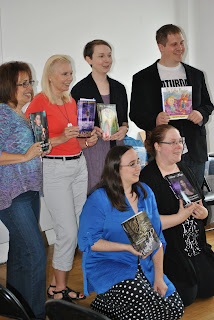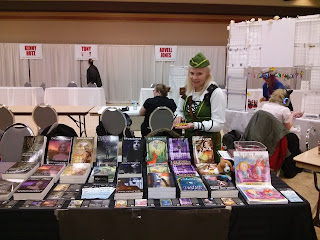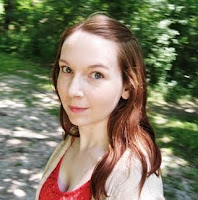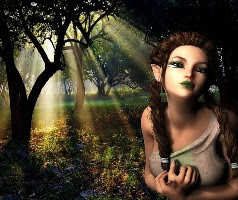 |
| Photo Courtesy of Fun Photos Pixabay |
When Elgiva, the protagonist of my fantasy novel
The Exile of Elindel, is forced to seek the society of humans in order to survive the winter, she can only do this by adopting a disguise. Although mythology insists that elves are shapeshifters, I have Elgiva borrow magic instead so she can change her appearance. Why would she need to do this? In these modern times, we have friendly elves that help Santa; we have the innocuous Elf on the Shelf; we have glamorous immortal beings like the elves in "Lord of the Rings" that fascinate us with their pointed ears and otherworldly beauty. Why on earth would an elf feel compelled to hide their true nature?
Belief in elves as actual beings is as old as belief in the Norse gods. Indeed Freyr, one of the gods most widely and ardently venerated by the Norse and Germanic peoples, dwelled in Alfheim, the elves’ homeland. Germanic Mythology described three divine races: the Aesir, the Vanir and the Alfar (the elves). The origins of the Vanir and Alfar are cloaked in mystery and the relationship between the gods and the elves was ambiguous enough to permit a number of possible connections between Freyr and the elves.
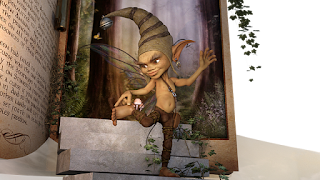 |
| Photo Courtesy of The Royalmen Pixabay |
However, godlike or not, elves were often seen as mischievous and spiteful, if not downright dangerous, liable to lash out with magic if crossed. For example, the word 'stroke' for a sudden paralysing seizure is an abbreviation of 'fairy stroke' or 'elf stroke' and was supposed to come from being elf-shot, a blow which struck down an animal or human victim. Similarly, cramps were often the punishment for annoying the elven folk. The Anglo-Saxons recognized being elf-shot as a valid condition and thought it was caused by unseen elves firing invisible arrows at a person or animal, causing sudden shooting pains in a particular part of the body. And should a person’s hair become matted or knotted, he or she was said to be sporting elf-locks, that some unhelpful elf had tangled up. This was particularly said of the hair of sleeping children. And keep an eye on those children, for elves like to steal them!
Given their capricious and magical nature and supernatural origins, it is no wonder the Anglo-Saxons feared them. So Elgiva could not have strolled into a human settlement with impunity and was compelled to cloak herself in enchantment in order to pass as a human.
Scandinavian folklore boasts an abundance of elves, trolls and other mythological creatures. Most people in Denmark, Norway, and Sweden haven't taken any of them as fact since the 19th century, but it’s a different story in Iceland. Surveys taken there even in the present century revealed that more than half those surveyed believed in elves, while a number of major road construction projects have been halted, thanks to protestors concerned about the deleterious effects it would have on the habitat and culture of the resident elves.
Elves have been part of our folklore for a very long time. How we have interpreted them down the ages has varied tremendously. They originated as demi-gods, became malicious and belligerent, then friendly and industrious, and now they feature heavily in fiction and popular culture. They may be light elves. They may be dark elves. One thing is certain, good or bad, elves are always cool!
How about curling up with my epic fantasy while you contemplate the possibility of elves?
Elgiva, a young elf banished from Elvendom, must seek shelter among the Saxons as her only hope of surviving the coming winter.
Godwin, a Briton enslaved by the Saxons, is a man ignorant of his own inheritance and the secret of power he possesses.
A mysterious enemy, who will stop at nothing to wield absolute power over Elvendom, is about to make his move.
When destiny throws Elgiva and Godwin together, they embark upon the quest for the legendary Lorestone, the only thing that can save Elvendom from the evil that threatens to destroy it.
There is help to be found along the way from a petulant pony and a timid elf boy but, as the strength of their adversary grows, can Elgiva’s friends help her to find the Lorestone before it falls into the wrong hands?
EXCERPT
The night was waning when Elgiva woke, wondering where she was. The dark ceiling of Joskin’s cave hung above her, and everything had a reddish glow, cast by the embers of the fire. She slid from under the fur coverlet, her skin tightening at the loss of its warmth, and searched for her leather sandals.
Something had woken her, something that waited outside the cave. A runnel of dread ran down her spine.
She had an inexplicable sense of impending danger, but it was too insistent to ignore. An unnamed instinct stopped her from alerting her companions. She must face this menace alone.
She left the cave as quietly as she could. Her heart pounded in her throat as she peered between the rowan trees and searched the night. Whatever had awakened her, it beckoned. She held her breath and listened, but her ears detected nothing, save for a silence as dark and empty as an abandoned crypt.
It would soon be daybreak, but the sun had yet to rise, and the dark beyond the cave swarmed with potential horrors. She stepped out from among the rowans, relying on her acute senses to make out her surroundings. An unnatural calm gripped the night and as her sandals whispered against the cold grass, they sounded abnormally loud. She feared they would betray her presence.
After a while, she came to a stop and searched the trees. Thin strands of mist curled along the ground, cold and clammy, like an exhalation of sickness.
She hugged her shoulders, knotted her fingers in the cascade of her hair, and shivered in her ragged robe. All around her, the silence seemed to be drawing into focus.
“Who is it?” Her throat was too dry for her purpose. She swallowed and licked her lips. “Who’s there? I know you’re there. I can . . . I can feel you!”
Feel you.
A flash of silver sliced through the dark, and Elgiva gasped in fear. Her arms came up to shield her face as the beam struck a rock several yards ahead. It exploded with a whoosh and sent up thousands of splinters of light, which fell to the ground and sizzled in the mist.
A shape now stood upon the rock, its form concealed in a black, hooded cloak.
Elgiva clutched the amulet to her breast. Her hands were white with terror. “In the name of Faine, who are you? What sort of trick is this?”
A soft, sly voice spoke back to her. “Why should you fear magic?”
“What do you want?” she pleaded, her voice a croak of fear.
“To see for myself.”
“To see what?”
The dark shape sniggered, but made no answer. Instead, it swept its cloak aside, and a cloud of sparks flew out and covered the ground with beads of light.
Elgiva stepped back unsteadily, resolved to flee.
“Stay!” commanded the creature.
It raised a skeletal hand, and the forefinger swung towards Elgiva and pinned her against the darkness, holding her like a rivet of bone. No elf, no wilthkin, ever owned such a hand. Her legs threatened to buckle beneath her. This had to be a nightmare; she was still asleep in the cave. But no, it was all too real.
“Who are you? What do you want?” she cried. “I have . . . I have an amulet!”
The creature laughed derisively. “I am Death, and I have come for you.”
It began to radiate a sickly green light, enveloping itself in a caul of brilliance that pulsated with force. The light grew in size until the trees behind it were bathed in its angry glare. It reached for Elgiva, like a foul stench creeping along a breeze, and she was helpless. The creature’s power throbbed in the darkness.
Within the taut coils of her fear, her instincts screamed at her to run, but her limbs had turned to stone.
Siriol, Siriol, help me . . . help . . .
With a shriek of glee, the creature increased the throb of its power. Elgiva’s mind was suddenly invaded by an inexplicable force. She became divorced from herself and watched from a great distance, waiting for the horror to unfold.
Born in Stafford in the UK, Carol Browne was raised in Crewe, Cheshire, which she thinks of as her home town. Interested in reading and writing at an early age, Carol pursued her passions at Nottingham University and was awarded an honours degree in English Language and Literature. Now living and working in the Cambridgeshire countryside, Carol usually writes fiction and is a contracted author at Burning Willow Press. Her non-fiction book is available at Dilliebooks.
Stay connected with Carol on her
website and blog,
Facebook, and
Twitter.




















